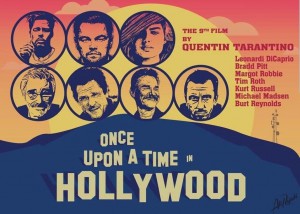My column for the Spanish monthly Caiman Cuadernos de Cine, submitted on July 25, 2019. — J.R


“The strongest argument for the unmaterialistic character of American life,” Mary McCarthy wrote in 1947, “is the fact that we tolerate conditions that are, from a materialistic point of view, intolerable.” Two kinds of doublethink fantasy emanating from this, both deriving from media tropes, can be found in the best and worst examples of recent American cinema that I saw in Chicago in July. These are, respectively, the four seasons of Crazy Ex-Girlfriend (2015-2019), a musical sitcom created by Rachel Bloom and Aline Brosh McKenna, which I saw alone on Netflix via my laptop, and Quintin Tarantino’s Once Upon a Time in Hollywood, which I saw in 70mm at the Music Box with a full audience shortly afterwards. Significantly, deranged women are the basis of what I find exhilarating in the former and despicable in the latter.

The deranged woman in the first is a high-powered, neurotic Jewish lawyer (Bloom) in New York who rejects her firm’s partnership offer in order to move to a nondescript California suburb “four hours from the beach” to work for a mediocre firm and chase after a former boyfriend, whom she met at a camp as a teenager, meanwhile remaining in denial that her romantic obsession motivated her move. Read more
From the Chicago Reader (December 22, 1995). — J.R.

Nixon
* (Has redeeming facet)
Directed by Oliver Stone
Written by Stephen J. Rivele,
Christopher Wilkinson, and Stone
With Anthony Hopkins, Joan Allen, James Woods, J.T. Walsh, Paul Sorvino, Powers Boothe, David Hyde Pierce, E.G. Marshall, Madeleine Kahn, David Paymer, and Mary Steenburgen.

Did we really win the cold war? I know that capitalism prevailed on the economic front, but I’m less sure about the cultural front. I suspect a capitalist version of Stalinist culture has triumphed rather than any sort of democracy: Stalinist culture meaning calcified, state-supported art built around solemn, hulking father figures — something like Oliver Stone’s latest two-ton Christmas turkey, Nixon. If we recognize that Disney has effectively become the federal government, the rest of the scenario falls into place. Just as Stalin’s flunkies had to praise the official “masterpieces” of Stalinist art no matter how inert or uninventive they were, Nixon‘s producers (who’ve spent millions promoting the movie) have guaranteed that media savants are already describing Stone’s Nixon as a figure of Shakespearean proportions rather than the poorly cast, two-dimensional numskull decked out with a few grade-Z horror-movie traits that he is.
Toddlers have been treated a lot more like adults by the movies this year than grown-ups have. Read more
From the Summer 2015 Artforum.(This version is slightly different.) — J.R.


Doctor (off): Has this happened to you before?
Ventura: It will happen again, yes it will.

Trying to rationalize Pedro Costa’s Horse Money in terms of a synopsis is ultimately a fool’s game, but connecting it to recent Portuguese history is a necessity. The April 25, 1974 military coup known today as the Carnation Revolution, led by the leftwing MFA and ending the Estado Novo dictatorship that lasted almost half a century, took place when Costa was in his early teens. Ventura, Costa’s slightly older principal protagonist in practically all of his other recent films — a Cape Verdean immigrant and construction worker, always playing himself and scripting his own dialogue — was around in Lisbon too. But as Costa told Mark Peranson in an interview in Cinema Scope, Ventura’s experience of the same events was radically different:
I was very lucky to have been a young man in a revolution, really lucky….And I was discovering a lot of things, music and politics and film and girls, everything at the same time, and I was happy and anarchist and shouting in the streets and occupying factories and things like that — I was 13 so I was a bit blind. Read more








